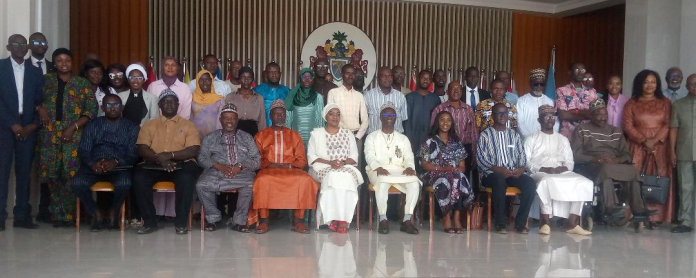By Ndey Sowe
The Ministry of Higher Education, Research, Science and Technology (MoHERST) has validated the Technical and Vocational Education and Training (TVET) Graduates Tracer Study Report 2024, funded by the World Bank through its Central Project Coordination Unit at the Ministry of Finance and Economic Affairs (MoFEA).
The validation exercise, held on Tuesday, 2nd April 2025 at the Sir Dawda Kairaba Jawara International Conference Center, sought to provide an evidence-based evaluation of TVET program outcomes in The Gambia, contributing to sectoral improvements and policy enhancements.
Stakeholders gathered to review the findings and recommendations outlined in the report, which aims to shape future policies and programs that align with the needs of TVET graduates and the broader labor market.
Professor Pierre Gomez, Minister of Higher Education, Research, Science and Technology, in his opening remarks, emphasized the report’s significance.
“It is an honour to join you today as we validate the Final Report of The Gambia TVET Tracer Study—a critical milestone in our collective effort to transform Technical and Vocational Education and Training (TVET) in The Gambia. This study is more than just a report; it is a testament to our commitment to building a skills-driven economy, ensuring that every young Gambian has access to quality training, meaningful employment, and sustainable livelihoods,” Professor Gomez stated.
He further highlighted that the study offers empirical insights into employment trends, industry needs, and the impact of TVET programs on graduates’ career paths. He noted that the findings underline progress made, challenges that persist, and opportunities to strengthen the TVET ecosystem.
“As we validate this report today, let us reaffirm our collective responsibility to ensure that TVET remains a powerful tool for national development. Let us work together—government, training institutions, industry leaders, and development partners—to bridge the skills gap, foster entrepreneurship, and create an environment where Gambian youth can thrive in an ever-evolving job market,” he added.
Anna Taal, Manager of the Central Project Coordination Unit (CPCU) at MoFEA, underscored the report’s role in shaping discourse on TVET effectiveness and economic impact.
“The Gambia TVET Graduates Tracer Study is not just another report; it is a roadmap to improving our TVET systems. The significance of the study underpins MoHERST’s commitment to evidence-based reform, seeking to critically examine the efficacy of TVET programs in fostering economic resilience and social mobility,” she said.
By systematically assessing the employment trajectories and entrepreneurial engagements of TVET graduates from 2018 to 2022, she added that the study provides a robust analytical framework for evaluating the alignment between educational outcomes and labor market needs.
Speaking on behalf of the research team and Africa Label Group (ALG), Jacob Sanwidi highlighted some of their ongoing projects in The Gambia.
“Our primary objective aligns with the overarching goals of Youth Empowerment through TVET initiative in The Gambia. Specifically, our study provides an evidence-based evaluation of the outcomes of Technical and Vocational Education and Training (TVET) programs in the country. Commissioned to assess the effectiveness of TVET initiatives, this study examines key indicators such as employment status, skill alignment, and the socio-economic impacts on graduates from 2018 to 2022,” Sanwidi explained.
He added that by identifying strengths and challenges within the current system, the report offers actionable insights to inform policy-making, enhance program delivery, and improve alignment between TVET education and labor market needs.
The study covers several key areas, including the effectiveness of TVET programs, employment and labor market outcomes, social inclusion and accessibility, entrepreneurship and innovation, evaluation of support mechanisms, and priority areas for development.
Ultimately, the study serves as a guide toward a more effective and equitable TVET system, ensuring that graduates are not just trained, but are empowered to contribute meaningfully to The Gambia’s economic growth. It reinforces the indispensable role of rigorous empirical inquiry in shaping both educational and economic trajectories.


















